
List of birds of Fiji
Encyclopedia
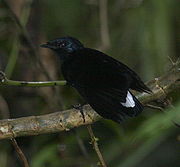
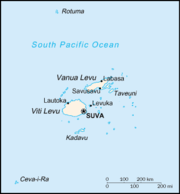
Fiji
Fiji , officially the Republic of Fiji , is an island nation in Melanesia in the South Pacific Ocean about northeast of New Zealand's North Island...
is the richest in West Polynesia
Polynesia
Polynesia is a subregion of Oceania, made up of over 1,000 islands scattered over the central and southern Pacific Ocean. The indigenous people who inhabit the islands of Polynesia are termed Polynesians and they share many similar traits including language, culture and beliefs...
. Numerous families reach the farthest east of their range, and the island is home to several endemic species and genera
Genus
In biology, a genus is a low-level taxonomic rank used in the biological classification of living and fossil organisms, which is an example of definition by genus and differentia...
, as well as sharing several more endemics with its close neighbours Tonga
Tonga
Tonga, officially the Kingdom of Tonga , is a state and an archipelago in the South Pacific Ocean, comprising 176 islands scattered over of ocean in the South Pacific...
and Samoa
Samoa
Samoa , officially the Independent State of Samoa, formerly known as Western Samoa is a country encompassing the western part of the Samoan Islands in the South Pacific Ocean. It became independent from New Zealand in 1962. The two main islands of Samoa are Upolu and one of the biggest islands in...
.
Ther avifauna of Fiji has been heavily impacted by the arrival of humans. Several species (and some genera) were lost
Extinction
In biology and ecology, extinction is the end of an organism or of a group of organisms , normally a species. The moment of extinction is generally considered to be the death of the last individual of the species, although the capacity to breed and recover may have been lost before this point...
in prehistory and are known only from fossil
Fossil
Fossils are the preserved remains or traces of animals , plants, and other organisms from the remote past...
remains. Other have become extinct more recently, and some species remain very close to extinction. It is certain that the current knowledge of the previous ranges of many species is incomplete and further research is needed.
This is a list of the bird species recorded in Fiji. The avifauna of Fiji
Fiji
Fiji , officially the Republic of Fiji , is an island nation in Melanesia in the South Pacific Ocean about northeast of New Zealand's North Island...
includes a total of 149 species, of which 27 are endemic
Endemism in birds
An endemic bird area is a region of the world that contains two or more restricted-range species, while a "secondary area" contains one or more restricted-range species. Both terms were devised by Birdlife International....
, 13 have been introduced
Introduced species
An introduced species — or neozoon, alien, exotic, non-indigenous, or non-native species, or simply an introduction, is a species living outside its indigenous or native distributional range, and has arrived in an ecosystem or plant community by human activity, either deliberate or accidental...
by humans, and 34 are rare or accidental. Numerous species listed have been extirpated
Local extinction
Local extinction, also known as extirpation, is the condition of a species which ceases to exist in the chosen geographic area of study, though it still exists elsewhere...
from Fiji and are not included in the species count, although they are listed where known. 17 species are globally threatened.
This list's taxonomic
Taxonomy
Taxonomy is the science of identifying and naming species, and arranging them into a classification. The field of taxonomy, sometimes referred to as "biological taxonomy", revolves around the description and use of taxonomic units, known as taxa...
treatment (designation and sequence of orders, families, and species) and nomenclature (common and scientific names) follow the conventions of Clements
James Clements
Dr. James Franklin Clements was an ornithologist, author and very successful businessman. He was born in New York....
's 5th edition. The family accounts at the beginning of each heading reflects this taxonomy, as do the species counts found in each family account. Introduced and accidental species are included in the total counts for Fiji.
The following tags have been used to highlight certain relevant categories. (?) Indicates uncertain record or uncertainty about current status of species.
- (V) Vagrant A species that rarely or accidentally occurs in Fiji.
- (B) Breeder A species that breeds in Fiji.
- (M) Migrant A species that regularly migrates to Fiji.
- (P) Passage Migrant A species that neither breeds nor winters in Fiji but regularly passes through.
- (I) Introduced A species introduced to Fiji as a consequence, direct or indirect, of human actions.
- (X) Extirpated A species that no longer occurs here although populations may exist elsewhere.
- (*) Endemic A species that is endemic to Fiji.
| Table of contents |
|---|
Non-passerines: Grebes . Albatrosses . Shearwaters and Petrels . Storm-Petrels . Tropicbirds . Pelicans . Boobies and Gannets . Frigatebirds . Bitterns, Herons and Egrets . Ibises and Spoonbills . Ducks, Geese and Swans . Hawks, Kites and Eagles . Falcons . Megapodes . Turkeys . Pheasants and Partridges . Rails, Crakes, Gallinules, and Coots . Plovers and Lapwings . Sandpipers and allies . Skuas . Gulls . Terns . Pigeons and Doves . Parrots and lorikeets . Cuckoos . Barn owls . Swifts . Kingfishers . |
Passerines: Swallows and Martins . Cuckoo-shrikes . Bulbuls . Thrushes and allies . Old World warblers . Fantails . Monarch flycatchers . Australasian robins . Whistlers and allies . White-eyes . Honeyeaters . Woodswallows . Bellmagpies and allies . Starlings . Waxbills and allies . Sparrows . |
See also References |
Grebes
Order: Podicipediformes. Family: Podicipedidae| Species | Viti Levu Viti Levu Viti Levu is the largest island in the Republic of Fiji, the site of the nation's capital, Suva, and home to a large majority of Fiji's population.- Geography and economy :... | Vanua Levu Vanua Levu Vanua Levu , formerly known as Sandalwood Island, is the second largest island of Fiji. Located 64 kilometres to the north of the larger Viti Levu, the island has an area of 5,587.1 km² and a population of some 130,000.- Geography :... | Taveuni Taveuni Taveuni is the third-largest island in Fiji, after Vanua Levu and Viti Levu, with a total land area of 435 square kilometers . The cigar-shaped island, a massive shield volcano which rises from the floor of the Pacific Ocean, is situated 6.5 kilometers to the east of Vanua Levu, across the... | Kadavu Kadavu Kadavu , with an area of , is the fourth largest island in Fiji, and the largest island in the Kadavu Group, a volcanic archipelago consisting of Kadavu, Ono, Galoa and a number of smaller islands in the Great Astrolabe Reef... | Lomaiviti Lomaiviti The Lomaiviti archipelago of Fiji consists of seven main islands and a number of smaller ones. They cover a total area of 411 square kilometers, and had a population of 16,461 at the most recent census in 2007... | Lau Lau Lau may refer to:An indigenous people that live on the Solomon Islands.People with the German/Austrian surname:* Charlie Lau, catcher and hitting coach in Major League Baseball* Laurence Lau , actor... | Rotuma Rotuma Rotuma is a Fijian dependency, consisting of Rotuma Island and nearby islets. The island group is home to a small but unique indigenous ethnic group which constitutes a recognizable minority within the population of Fiji, known as "Rotumans"... |
|---|---|---|---|---|---|---|---|
| Australasian Grebe Australasian Grebe The Australasian Grebe is a tiny waterbird common on fresh water lakes and rivers in greater Australia, New Zealand and on nearby Pacific islands. At 25-27 cm in length, it is one of the smallest members of the grebe family... Tachybaptus novaehollandiae |
X |
Albatrosses
Order: ProcellariiformesProcellariiformes
Procellariiformes is an order of seabirds that comprises four families: the albatrosses, petrels and shearwaters, storm petrels, and diving petrels...
. Family: Diomedeidae
The albatrosses are among the largest of flying birds, and the great albatrosses from the genus Diomedea have the largest wingspans of any extant birds. There are 21 species worldwide and 1 species which occur in Fiji.
| Species | Viti Levu | Vanua Levu | Taveuni | Kadavu | Lomaiviti Lomaiviti The Lomaiviti archipelago of Fiji consists of seven main islands and a number of smaller ones. They cover a total area of 411 square kilometers, and had a population of 16,461 at the most recent census in 2007... | Lau | Rotuma | |
|---|---|---|---|---|---|---|---|---|
| Black-browed Albatross Black-browed Albatross The Black-browed Albatross or Black-browed Mollymawk, Thalassarche melanophrys, is a large seabird of the albatross family Diomedeidae, and it is the most widespread and common albatross.-Taxonomy:... Thalassarche melanophris |
V | |||||||
Shearwaters and petrels
Order: ProcellariiformesProcellariiformes
Procellariiformes is an order of seabirds that comprises four families: the albatrosses, petrels and shearwaters, storm petrels, and diving petrels...
. Family: Procellariidae
Procellariidae
The family Procellariidae is a group of seabirds that comprises the fulmarine petrels, the gadfly petrels, the prions, and the shearwaters. This family is part of the bird order Procellariiformes , which also includes the albatrosses, the storm-petrels, and the diving petrels.The procellariids are...
The procellariids are the main group of medium-sized 'true petrels', characterised by united nostrils with a medium septum, and a long outer functional primary. There are 75 species worldwide and 16 species which occur in Fiji.
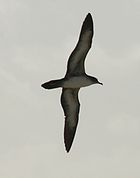
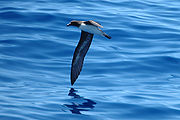
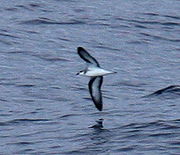
| Species | Viti Levu | Vanua Levu | Taveuni | Kadavu | Lomaiviti | Lau | Rotuma | |
|---|---|---|---|---|---|---|---|---|
| Southern Giant Petrel Southern Giant Petrel The Southern Giant Petrel , also known as the Antarctic Giant Petrel, Giant Fulmar, Stinker, and Stinkpot, is a large seabird of the southern oceans. Its distribution overlaps broadly with the similar Northern Giant Petrel, though it overall is centered slightly further south... Macronectes giganteus |
V | |||||||
| Cape Petrel Cape Petrel The Cape Petrel also called Cape Pigeon or Pintado Petrel, is a common seabird of the Southern Ocean from the family Procellariidae. It is the only member of the genus Daption, and is allied to the fulmarine petrels, and the Giant Petrels. It is also sometimes known as the Cape Fulmar... Daption capense |
V | |||||||
| Wedge-tailed Shearwater Wedge-tailed Shearwater The Wedge-tailed Shearwater, Puffinus pacificus is a medium-large shearwater in the seabird family Procellariidae. It is one of the shearwater species that is sometimes referred to as a Muttonbird, like the Sooty Shearwater of New Zealand and the Short-tailed Shearwater of Australia... Puffinus pacificus |
B | B | B | B | B | B | B | |
| Audubon's Shearwater Audubon's Shearwater Audubon's Shearwater, Puffinus lherminieri, is a common tropical seabird from the family Procellariidae. Sometimes called Dusky-backed Shearwater, the scientific name of this species commemorates the French naturalist Félix Louis L'Herminier.... Puffinus lherminieri |
B | B | B | B | B | B | ||
| Buller's Shearwater Buller's Shearwater Buller's Shearwater is a Pacific species of seabird in the family Procellariidae; it is also known as the Grey-backed Shearwater or New Zealand Shearwater... Puffinus bulleri |
V | |||||||
| Sooty Shearwater Sooty Shearwater The Sooty Shearwater is a medium-large shearwater in the seabird family Procellariidae. In New Zealand it is also known by its Māori name tītī and as "muttonbird", like its relatives the Wedge-tailed Shearwater and the Australian Short-tailed Shearwater The Sooty Shearwater (Puffinus griseus) is... Puffinus griseus |
V | |||||||
| Short-tailed Shearwater Short-tailed Shearwater The Short-tailed Shearwater or Slender-billed Shearwater , also called Yolla or Moonbird, and commonly known as the muttonbird in Australia, is the most abundant seabird species in Australian waters, and is one of the few Australian native birds in which the chicks are commercially harvested... Puffinus tenuirostris |
V | |||||||
| Christmas Shearwater Christmas Shearwater The Christmas Shearwater, Puffinus nativitatis, is a medium-sized shearwater of the tropical Central Pacific. It is a poorly known species due to its remote nesting habits, and it has not been extensively studied at sea either.... Puffinus nativitatis |
V | |||||||
| Fiji Petrel Fiji Petrel The Fiji Petrel , also known as MacGillivray's Petrel, is a small, dark gadfly petrel.The Fiji Petrel was originally known from one immature specimen found in 1855 on Gau Island, Fiji by naturalist John MacGillivray on board 'HMS Herald' who took the carcass to the British Museum in London... Pseudobulweria macgillivrayi* |
B | |||||||
| Tahiti Petrel Tahiti Petrel The Tahiti Petrel, Pétrel De Tahiti, or Petrel De Tahití is a species of seabird in the Procellariidae family.... Pseudobulweria rostrata |
B | B | ||||||
| Collared Petrel Collared Petrel The Collared Petrel is a species of seabird in the Procellariidae family. It is sometimes regarded as a subspecies of Gould's Petrel .... Pterodroma brevipes |
B | B | B | B | B | B | ||
| Great-winged Petrel Great-winged Petrel The Great-winged Petrel or Grey-faced Petrel, Pterodroma macroptera, is a petrel. In New Zealand it is also known by its Māori name oi and as a muttonbird.- Taxonomy :... Pterodroma macroptera |
V | |||||||
| Phoenix Petrel Phoenix Petrel The Phoenix Petrel, Pterodroma alba is a medium-sized, up to long, tropical seabird with a wingspan of . It has a dark brown upperparts plumage, white below and whitish throat. Both sexes are similar.... Pterodroma alba |
V | |||||||
| Herald Petrel Herald Petrel The Trindade Petrel, Pterodroma arminjoniana, is a species of seabird and a member of the gadfly petrels. The bird is 35-39 cm in size, with a 88-102 cm wingspan.... Pterodroma arminjoniana |
V | |||||||
| Mottled Petrel Mottled Petrel The Mottled Petrel is a species of seabird and a member of the gadfly petrels. The bird is 33-35 cm in size, with a 74-82 cm wingspan.... Pterodroma inexpectata |
P | |||||||
| White-necked Petrel White-necked Petrel The White-necked Petrel , also known as the White-naped Petrel, is a species of seabird in the Procellariidae family. During non-breeding season it occurs throughout a large part of the Pacific, but it is only known to breed on Macauley Island in New Zealand's Kermadec Islands and the Australian... Pterodroma cervicalis |
V | |||||||
| Black-winged Petrel Black-winged Petrel The Black-winged Petrel is a species of seabird in the Procellariidae family.It is found in Australia, French Polynesia, Japan, New Caledonia, New Zealand, Norfolk Island, and the United States.-References:... Pterodroma nigripennis |
V | |||||||
Storm-Petrels
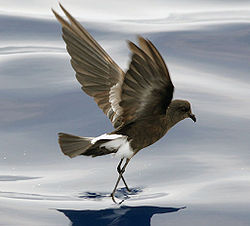
Procellariiformes
Procellariiformes is an order of seabirds that comprises four families: the albatrosses, petrels and shearwaters, storm petrels, and diving petrels...
. Family: Hydrobatidae
The storm-petrel
Storm-petrel
Storm petrels are seabirds in the family Hydrobatidae, part of the order Procellariiformes. These smallest of seabirds feed on planktonic crustaceans and small fish picked from the surface, typically while hovering. The flight is fluttering and sometimes bat-like.Storm petrels have a cosmopolitan...
s are relatives of the petrel
Petrel
Petrels are tube-nosed seabirds in the bird order Procellariiformes. The common name does not indicate relationship beyond that point, as "petrels" occur in three of the four families within that group...
s, and are the smallest of sea-birds. They feed on plankton
Plankton
Plankton are any drifting organisms that inhabit the pelagic zone of oceans, seas, or bodies of fresh water. That is, plankton are defined by their ecological niche rather than phylogenetic or taxonomic classification...
ic crustaceans and small fish picked from the surface, typically while hovering. The flight is fluttering and sometimes bat
Bat
Bats are mammals of the order Chiroptera "hand" and pteron "wing") whose forelimbs form webbed wings, making them the only mammals naturally capable of true and sustained flight. By contrast, other mammals said to fly, such as flying squirrels, gliding possums, and colugos, glide rather than fly,...
-like. There are 21 species worldwide and 4 species which occur in Fiji.
| Species | Viti Levu | Vanua Levu | Taveuni | Kadavu | Lomaiviti | Lau | Rotuma | |
|---|---|---|---|---|---|---|---|---|
| Wilson's Storm-Petrel Wilson's Storm-petrel Wilson's Storm Petrel , also known as Wilson's Petrel, is a small seabird of the storm-petrel family. It is one of the most abundant bird species in the world and has a circumpolar distribution mainly in the seas of the southern hemisphere but extending northwards during the summer of the northern... Oceanites oceanicus |
P | |||||||
| White-faced Storm-Petrel White-faced Storm-petrel The White-faced Storm Petrel , also known as White-faced Petrel is a small seabird of the storm-petrel family. It is the only member of the monotypic genus Pelagodroma.... Pelagodroma marina |
V | |||||||
| Black-bellied Storm-Petrel Black-bellied Storm-petrel The Black-bellied Storm Petrel is a species of seabird in the Hydrobatidae family.It is found in Antarctica, Argentina, Australia, Bouvet Island, Brazil, Chile, Falkland Islands, French Polynesia, French Southern Territories, Madagascar, Mozambique, New Zealand, Oman, Peru, Saint Helena, São Tomé... Fregetta tropica |
V | |||||||
| Polynesian Storm-petrel Polynesian Storm-petrel The Polynesian Storm Petrel is a species of seabird in the Hydrobatidae family. It is placed in the monotypic genus Nesofregetta.... Nesofregatta fuliginosa |
B | B | B | B | B | |||
Tropicbirds
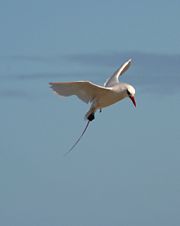
Pelecaniformes
The Pelecaniformes is a order of medium-sized and large waterbirds found worldwide. As traditionally—but erroneously—defined, they encompass all birds that have feet with all four toes webbed. Hence, they were formerly also known by such names as totipalmates or steganopodes...
. Family: Phaethontidae
Tropicbird
Tropicbird
Tropicbirds are a family, Phaethontidae, of tropical pelagic seabirds now classified in their own order Phaethontiformes. Their relationship to other living birds is unclear, and they appear to have no close relatives. There are three species in one genus, Phaethon...
s are slender white birds of tropical oceans, with exceptionally long central tail feathers. Their heads and long wings have black markings. There are 3 species worldwide and 2 species which occur in Fiji.
| Species | Viti Levu | Vanua Levu | Taveuni | Kadavu | Lomaiviti | Lau | Rotuma |
|---|---|---|---|---|---|---|---|
| Red-tailed Tropicbird Red-tailed Tropicbird The Red-tailed Tropicbird, Phaethon rubricauda, is a seabird that nests across the Indian and Pacific Oceans. It is the rarest of the tropicbirds, yet is still a widespread bird that is not considered threatened. It nests in colonies on oceanic islands.... Phaethon rubricauda |
B | B | B | B | B | B | B |
| White-tailed Tropicbird White-tailed Tropicbird The White-tailed Tropicbird Phaethon lepturus, is a tropicbird, smallest of three closely related seabirds of the tropical oceans and smallest member of the order Phaethontiformes. It occurs in the tropical Atlantic, western Pacific and Indian Oceans... Phaethon lepturus |
B | B | B | B | B | B | B |
Pelicans
Order: PelecaniformesPelecaniformes
The Pelecaniformes is a order of medium-sized and large waterbirds found worldwide. As traditionally—but erroneously—defined, they encompass all birds that have feet with all four toes webbed. Hence, they were formerly also known by such names as totipalmates or steganopodes...
. Family: Pelecanidae
Pelican
Pelican
A pelican, derived from the Greek word πελεκυς pelekys is a large water bird with a large throat pouch, belonging to the bird family Pelecanidae....
s are large water birds with a distinctive pouch under the beak. As with other members of the order Pelecaniformes, they have webbed feet with four toes. There are 8 species worldwide and 1 species which occurs in Fiji.
| Species | Viti Levu | Vanua Levu | Taveuni | Kadavu | Lomaiviti | Lau | Rotuma | |
|---|---|---|---|---|---|---|---|---|
| Australian Pelican Australian Pelican The Australian Pelican is a large water bird, widespread on the inland and coastal waters of Australia and New Guinea, also in Fiji, parts of Indonesia and as a vagrant to New Zealand.-Taxonomy:... Pelecanus conspicillatus |
V | |||||||
Boobies and gannets
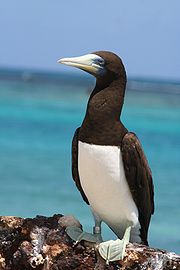
Pelecaniformes
The Pelecaniformes is a order of medium-sized and large waterbirds found worldwide. As traditionally—but erroneously—defined, they encompass all birds that have feet with all four toes webbed. Hence, they were formerly also known by such names as totipalmates or steganopodes...
. Family: Sulidae
Sulidae
The bird family Sulidae comprises the gannets and boobies. Collectively called sulidas, they are medium-large coastal seabirds that plunge-dive for fish and similar prey. The ten species in this family are often considered congeneric in older sources, placing all in the genus Sula...
The sulids comprise the gannet
Gannet
Gannets are seabirds comprising the genus Morus, in the family Sulidae, closely related to the boobies.The gannets are large black and white birds with yellow heads. They have long pointed wings and long bills. Northern gannets are the largest seabirds in the North Atlantic, with a wingspan of up...
s and boobies
Booby
A booby is a seabird in the genus Sula, part of the Sulidae family. Boobies are closely related to the gannets , which were formerly included in Sula.-Description:...
. Both groups comprise medium-to-large coastal sea-birds that plunge-dive for fish. There are 9 species worldwide and 3 species which occur in Fiji.
{| class="wikitable" style="text-align:center"
|+Sulidae
|-
! width="225"|Species !! Viti Levu !! Vanua Levu !! Taveuni !! Kadavu !! Lomaiviti !! Lau !! Rotuma
|-
! Masked Booby
Masked Booby
The Masked Booby, Sula dactylatra, is a large seabird of the booby family, Sulidae. This species breeds on islands in tropical oceans, except in the eastern Atlantic; in the eastern Pacific it is replaced by the Nazca Booby, Sula granti, which was formerly regarded as a subspecies of Masked Booby...
Sula dactylatra
| B || B || B || B || B || B || B
|-
! Red-footed Booby
Red-footed Booby
The Red-footed Booby, Sula sula, is a large seabird of the booby family, Sulidae. As suggested by the name, adults always have red feet, but the colour of the plumage varies. They are powerful and agile fliers, but they are clumsy in takeoffs and landings...
Sula sula
| B || B || B || B || B || B || B
|-
! Brown Booby
Brown Booby
The Brown Booby is a large seabird of the booby family, Sulidae. The adult brown booby reaches about in length. Its head and upper body are covered in dark brown, with the remainder being a contrasting white. The juvenile form is gray-brown with darkening on the head, wings and tail...
Sula leucogaster
| B || B || B || B || B || B || B
|}
Frigatebirds
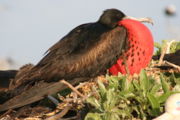
Pelecaniformes
The Pelecaniformes is a order of medium-sized and large waterbirds found worldwide. As traditionally—but erroneously—defined, they encompass all birds that have feet with all four toes webbed. Hence, they were formerly also known by such names as totipalmates or steganopodes...
. Family: Fregatidae
Frigatebird
Frigatebird
The frigatebirds are a family, Fregatidae, of seabirds. There are five species in the single genus Fregata. They are also sometimes called Man of War birds or Pirate birds. Since they are related to the pelicans, the term "frigate pelican" is also a name applied to them...
s are large sea-birds usually found over tropical oceans. They are large, black and white or completely black, with long wings and deeply-forked tails. The males have inflatable coloured throat pouches. They do not swim or walk, and cannot take off from a flat surface. Having the largest wingspan to body weight ratio of any bird, they are essentially aerial, able to stay aloft for more than a week. There are 5 species worldwide and 2 species which occur in Fiji.
| Species | Viti Levu | Vanua Levu | Taveuni | Kadavu | Lomaiviti | Lau | Rotuma |
|---|---|---|---|---|---|---|---|
| Great Frigatebird Great Frigatebird The Great Frigatebird is a large dispersive seabird in the frigatebird family. Major nesting populations are found in the Pacific and Indian Oceans, as well as a population in the South Atlantic.... Fregata minor |
R | R | R | R | R | R | R |
| Lesser Frigatebird Lesser Frigatebird The Lesser Frigatebird, Fregata ariel, is a species of frigatebird.It nests in Australia, among other locations.There is a single record from the Western Palearctic, from Eilat in the Gulf of Aqaba.... Fregata ariel |
B | B | B | B | B | B | B |
Bitterns, herons and egrets
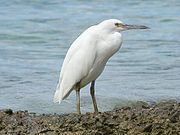
Ciconiiformes
Traditionally, the order Ciconiiformes has included a variety of large, long-legged wading birds with large bills: storks, herons, egrets, ibises, spoonbills, and several others. Ciconiiformes are known from the Late Eocene...
. Family: Ardeidae
The family Ardeidae contains the bittern
Bittern
Bitterns are a classification of birds in the heron family, Ardeidae, a family of wading birds. Species named bitterns tend to be the shorter-necked, often more secretive members of this family...
s, heron
Heron
The herons are long-legged freshwater and coastal birds in the family Ardeidae. There are 64 recognised species in this family. Some are called "egrets" or "bitterns" instead of "heron"....
s and egret
Egret
An egret is any of several herons, most of which are white or buff, and several of which develop fine plumes during the breeding season. Many egrets are members of the genera Egretta or Ardea which contain other species named as herons rather than egrets...
s. Herons and egrets are medium to large sized wading birds with long necks and legs. Bitterns tend to be shorter necked and more wary. Unlike other long-necked birds suck as storks, ibises and spoonbills, members of Ardeidae fly with their necks retracted. There are 61 species worldwide and 4 species which occur in Fiji.
| Species | Viti Levu | Vanua Levu | Taveuni | Kadavu | Lomaiviti | Lau | Rotuma | |
|---|---|---|---|---|---|---|---|---|
| Great Egret Great Egret The Great Egret , also known as the Great White Egret or Common Egret, White Heron, or Great White Heron, is a large, widely-distributed egret. Distributed across most of the tropical and warmer temperate regions of the world, in southern Europe it is rather localized... Ardea alba |
V | |||||||
| Grey Heron Grey Heron The Grey Heron , is a wading bird of the heron family Ardeidae, native throughout temperate Europe and Asia and also parts of Africa. It is resident in the milder south and west, but many birds retreat in winter from the ice in colder regions... Ardea cinerea |
v | |||||||
| Green Heron Green Heron The Green Heron is a small heron of North and Central America. It was long considered conspecific with its sister species the Striated Heron , and together they were called "Green-backed Heron"... Butorides virescens |
B | B | B | B | B | B | ||
| White-faced Heron White-faced Heron The White-faced Heron, Egretta novaehollandiae, also known as the White-fronted Heron, and incorrectly as the Grey Heron, or Blue Crane, is a common bird throughout most of Australasia, including New Guinea, the islands of Torres Strait, Indonesia, New Zealand, the islands of the Subantarctic, and... Egretta novaehollandiae |
B? | |||||||
| Eastern Reef Egret Eastern Reef Egret The Eastern Reef Heron , also known as the Pacific Reef Egret or Eastern Reef Egret, is a kind of heron. They are found in many areas of Asia including the oceanic region of India, Southeast Asia, Japan, Polynesia, and in Australia, Tasmania and New Zealand.Pacific Reef Herons are medium-sized... Egretta sacra |
B | B | B | B | B | B | B | |
Ibises and spoonbills
Order: CiconiiformesCiconiiformes
Traditionally, the order Ciconiiformes has included a variety of large, long-legged wading birds with large bills: storks, herons, egrets, ibises, spoonbills, and several others. Ciconiiformes are known from the Late Eocene...
. Family: Threskiornithidae
Threskiornithidae
The family Threskiornithidae includes 34 species of large terrestrial and wading birds, falling into two subfamilies, the ibises and the spoonbills. It was formerly known as Plataleidae. The spoonbills and ibises were once thought to be related to other groups of long-legged wading birds in the...
The Threskiornithidae is a family of large terrestrial and wading birds which includes the ibis
Ibis
The ibises are a group of long-legged wading birds in the family Threskiornithidae....
es and spoonbill
Spoonbill
Spoonbills are a group of large, long-legged wading birds in the family Threskiornithidae, which also includes the Ibises.All have large, flat, spatulate bills and feed by wading through shallow water, sweeping the partly opened bill from side to side...
s. They have long, broad wings with 11 primary and about 20 secondary feathers. They are strong fliers and despite their size and weight, very capable soarers. There are 36 species worldwide and 1 species which occurs in Fiji.
| Species | Viti Levu | Vanua Levu | Taveuni | Kadavu | Lomaiviti | Lau | Rotuma | |
|---|---|---|---|---|---|---|---|---|
| Glossy Ibis Glossy Ibis The Glossy Ibis is a wading bird in the ibis family Threskiornithidae.This is the most widespread ibis species, breeding in scattered sites in warm regions of Europe, Asia, Africa, Australia, and the Atlantic and Caribbean region of the Americas... Plegadis falcinellus |
V | |||||||
Ducks, geese and swans
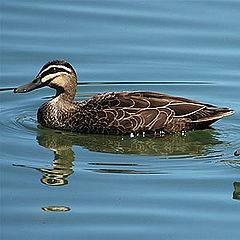
Anseriformes
The order Anseriformes contains about 150 living species of birds in three extant families: the Anhimidae , Anseranatidae , and the Anatidae, which includes over 140 species of waterfowl, among them the ducks, geese, and swans.All species in the order are highly adapted for an aquatic existence at...
. Family: Anatidae
Anatidae
Anatidae is the biological family of birds that includes ducks, geese and swans. The family has a cosmopolitan distribution, occurring on all the world's continents except Antarctica and on most of the world's islands and island groups...
The family Anatidae includes the duck
Duck
Duck is the common name for a large number of species in the Anatidae family of birds, which also includes swans and geese. The ducks are divided among several subfamilies in the Anatidae family; they do not represent a monophyletic group but a form taxon, since swans and geese are not considered...
s and most duck-like waterfowl, such as geese
Goose
The word goose is the English name for a group of waterfowl, belonging to the family Anatidae. This family also includes swans, most of which are larger than true geese, and ducks, which are smaller....
and swan
Swan
Swans, genus Cygnus, are birds of the family Anatidae, which also includes geese and ducks. Swans are grouped with the closely related geese in the subfamily Anserinae where they form the tribe Cygnini. Sometimes, they are considered a distinct subfamily, Cygninae...
s. These are birds that are modified for an aquatic existence with webbed feet, flattened bills and feathers that are excellent at shedding water due to an oily coating. There are 131 species worldwide and 3 species which occur in Fiji.
| Species | Viti Levu | Vanua Levu | Taveuni | Kadavu | Lomaiviti | Lau | Rotuma | |
|---|---|---|---|---|---|---|---|---|
| Wandering Whistling-Duck Dendrocygna arcuata |
X | |||||||
| Mallard Mallard The Mallard , or Wild Duck , is a dabbling duck which breeds throughout the temperate and subtropical Americas, Europe, Asia, and North Africa, and has been introduced to New Zealand and Australia.... Anas platyrhynchos |
V | |||||||
| Pacific Black Duck Pacific Black Duck The Pacific Black Duck is a dabbling duck found in much of Indonesia, New Guinea, Australia, New Zealand, and many islands in the southwestern Pacific, reaching to the Caroline Islands in the north and French Polynesia in the east. It is usually called the Grey Duck in New Zealand... Anas superciliosa |
B | B | B | B | B | |||
Hawks, kites and eagles
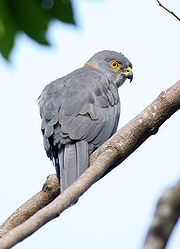
Falconiformes
The order Falconiformes is a group of about 290 species of birds that comprises the diurnal birds of prey. Raptor classification is difficult and the order is treated in several ways.- Classification problems :...
. Family: Accipitridae
Accipitridae
The Accipitridae, one of the two major families within the order Accipitriformes , are a family of small to large birds with strongly hooked bills and variable morphology based on diet. They feed on a range of prey items from insects to medium-sized mammals, with a number feeding on carrion and a...
Accipitridae is a family of birds of prey and include hawk
Hawk
The term hawk can be used in several ways:* In strict usage in Australia and Africa, to mean any of the species in the subfamily Accipitrinae, which comprises the genera Accipiter, Micronisus, Melierax, Urotriorchis and Megatriorchis. The large and widespread Accipiter genus includes goshawks,...
s, eagle
Eagle
Eagles are members of the bird family Accipitridae, and belong to several genera which are not necessarily closely related to each other. Most of the more than 60 species occur in Eurasia and Africa. Outside this area, just two species can be found in the United States and Canada, nine more in...
s, kites
Kite (bird)
Kites are raptors with long wings and weak legs which spend a great deal of time soaring. Most feed mainly on carrion but some take various amounts of live prey.They are birds of prey which, along with hawks and eagles, are from the family Accipitridae....
, harriers
Harrier (bird)
A harrier is any of the several species of diurnal hawks forming the Circinae sub-family of the Accipitridae family of birds of prey. Harriers characteristically hunt by flying low over open ground, feeding on small mammals, reptiles, or birds....
and Old World vultures. These birds have powerful hooked beaks for tearing flesh from their prey, strong legs, powerful talons, and keen eyesight. There are 233 species worldwide and 2 species which occur in Fiji.
| Species | Viti Levu | Vanua Levu | Taveuni | Kadavu | Lomaiviti | Lau | Rotuma |
|---|---|---|---|---|---|---|---|
| Fiji Goshawk Fiji Goshawk The Fiji Goshawk is a species of bird of prey in the Accipitridae family. It was once considered to be the same species as the Brown Goshawk of Australia and New Caledonia. It is endemic to Fiji, where it occurs on the larger islands of Viti Levu, Vanua Levu, Taveuni, Kadavu, Gau and Ovalau... Accipiter rufitorques* |
B | B | B | B | B | ||
| Swamp Harrier Swamp Harrier The Swamp Harrier also known as the Marsh Harrier, Australasian Harrier, Kāhu, Swamp-hawk or New Zealand Hawk is a large, slim bird of prey in the family Accipitridae.-Description:... Circus approximans |
B | B | B | B | B | B |
Falcons
Order: FalconiformesFalconiformes
The order Falconiformes is a group of about 290 species of birds that comprises the diurnal birds of prey. Raptor classification is difficult and the order is treated in several ways.- Classification problems :...
. Family: Falconidae
Falconidae
The falcons and caracaras are around 60 species of diurnal birds of prey that make up the family Falconidae. The family is divided into two subfamiles, Polyborinae, which includes the caracaras and forest falcons, and Falconinae, the falcons, kestrels and falconets.-Description:Falcons and...
Falconidae is a family of diurnal birds of prey. They differ from hawks, eagles, and kites in that they kill with their beaks instead of their feet. There are 62 species worldwide and 1 species which occurs in Fiji.
| Species | Viti Levu | Vanua Levu | Taveuni | Kadavu | Lomaiviti | Lau | Rotuma |
|---|---|---|---|---|---|---|---|
| Peregrine Falcon Peregrine Falcon The Peregrine Falcon , also known as the Peregrine, and historically as the Duck Hawk in North America, is a widespread bird of prey in the family Falconidae. A large, crow-sized falcon, it has a blue-gray back, barred white underparts, and a black head and "moustache"... Falco peregrinus |
B | B | B | B | B |
Megapodes
Order: GalliformesGalliformes
Galliformes are an order of heavy-bodied ground-feeding domestic or game bird, containing turkey, grouse, chicken, New and Old World Quail, ptarmigan, partridge, pheasant, and the Cracidae. Common names are gamefowl or gamebirds, landfowl, gallinaceous birds or galliforms...
. Family: Megapodidae
| Species | Viti Levu | Vanua Levu | Taveuni | Kadavu | Lomaiviti | Lau | Rotuma |
|---|---|---|---|---|---|---|---|
| Consumed Scrubfowl Megapodius alimentum |
X | ||||||
| Viti Levu Scrubfowl Megapodius amissus * |
X | X | |||||
| Noble Megapode Megavitiornis altirostris* |
X |
Turkeys
Order: GalliformesGalliformes
Galliformes are an order of heavy-bodied ground-feeding domestic or game bird, containing turkey, grouse, chicken, New and Old World Quail, ptarmigan, partridge, pheasant, and the Cracidae. Common names are gamefowl or gamebirds, landfowl, gallinaceous birds or galliforms...
. Family: Meleagrididae
Turkeys are similar to large pheasants but have a distinctive fleshy wattle that hangs from the beak, called a snood. There are two species, both native to the Americas, and 1 species which occurs in Fiji.
| Species | Viti Levu | Vanua Levu | Taveuni | Kadavu | Lomaiviti | Lau | Rotuma | |
|---|---|---|---|---|---|---|---|---|
| Wild Turkey Wild Turkey The Wild Turkey is native to North America and is the heaviest member of the Galliformes. It is the same species as the domestic turkey, which derives from the South Mexican subspecies of wild turkey .Adult wild turkeys have long reddish-yellow to grayish-green... Meleagris gallopavo |
I | |||||||
Pheasants and partridges

Galliformes
Galliformes are an order of heavy-bodied ground-feeding domestic or game bird, containing turkey, grouse, chicken, New and Old World Quail, ptarmigan, partridge, pheasant, and the Cracidae. Common names are gamefowl or gamebirds, landfowl, gallinaceous birds or galliforms...
. Family: Phasianidae
Phasianidae
The Phasianidae is a family of birds which consists of the pheasants and partridges, including the junglefowl , Old World Quail, francolins, monals and peafowl. The family is a large one, and is occasionally broken up into two subfamilies, the Phasianinae, and the Perdicinae...
The Phasianidae are a family of terrestrial birds which consists of quail
Quail
Quail is a collective name for several genera of mid-sized birds generally considered in the order Galliformes. Old World quail are found in the family Phasianidae, while New World quail are found in the family Odontophoridae...
s, partridge
Partridge
Partridges are birds in the pheasant family, Phasianidae. They are a non-migratory Old World group.These are medium-sized birds, intermediate between the larger pheasants and the smaller quails. Partridges are native to Europe, Asia, Africa, and the Middle East...
s, snowcock
Snowcock
The snowcocks are a group of bird species in the genus Tetraogallus of the pheasant family, Phasianidae. They are ground-nesting birds which breed in the mountain ranges of southern Eurasia from the Caucasus to the Himalayas and western China. The Himalayan Snowcock has been introduced...
s, francolin
Francolin
Francolins are birds that traditionally have been placed in the genus Francolinus, but now commonly are divided into multiple genera , although some of the major taxonomic listing sources have yet to divide them. They are members of the pheasant family, Phasianidae...
s, spurfowls, tragopan
Tragopan
Tragopan is a genus of bird in the family Phasianidae. These birds are commonly called "horny pheasants" because of two brightly-colored, fleshy horns on their heads that they can erect during courtship displays...
s, monal
Monal
A Monal is a bird of genus Lophophorus of the Pheasant family, Phasianidae. There are three species and several sub-species within the genus Lophophorus:* Himalayan Monal Lophophorus impejanus* Sclater's Monal Lophophorus sclateri...
s, pheasant
Pheasant
Pheasants refer to some members of the Phasianinae subfamily of Phasianidae in the order Galliformes.Pheasants are characterised by strong sexual dimorphism, males being highly ornate with bright colours and adornments such as wattles and long tails. Males are usually larger than females and have...
s, peafowl
Peafowl
Peafowl are two Asiatic species of flying birds in the genus Pavo of the pheasant family, Phasianidae, best known for the male's extravagant eye-spotted tail, which it displays as part of courtship. The male is called a peacock, the female a peahen, and the offspring peachicks. The adult female...
s and jungle fowls. In general, they are plump (although they may vary in size) and have broad, relatively short wings. There are 156 species worldwide and 2 species which occur in Fiji.
| Species | Viti Levu | Vanua Levu | Taveuni | Kadavu | Lomaiviti | Lau | Rotuma |
|---|---|---|---|---|---|---|---|
| Brown Quail Brown Quail The Brown Quail , also known as Swamp Quail, is an Australasian true quail of the family Phasianidae.The Brown Quail is distributed in agricultural areas, wet grasslands, shrublands and freshwater wetlands across much of New Guinea and the Lesser Sunda Islands as well as in northern, eastern,... Coturnix ypsilophora |
I | I | |||||
| Red Junglefowl Red Junglefowl The Red Junglefowl is a tropical member of the Pheasant family. They are thought to be ancestors of the domestic chicken with some hybridisation with the Grey Junglefowl... Gallus gallus |
IX | IX | I | I | I | I | I |
Rails, crakes, gallinules, and coots
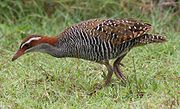
Gruiformes
The Gruiformes are an order containing a considerable number of living and extinct bird families, with a widespread geographical diversity. Gruiform means "crane-like"....
. Family: Rallidae
Rallidae
The rails, or Rallidae, are a large cosmopolitan family of small to medium-sized birds. The family exhibits considerable diversity and the family also includes the crakes, coots, and gallinules...
Rallidae is a large family of small to medium-sized birds which includes the rails, crakes, coot
Coot
Coots are medium-sized water birds that are members of the rail family Rallidae. They constitute the genus Fulica. Coots have predominantly black plumage, and, unlike many of the rails, they are usually easy to see, often swimming in open water...
s, and gallinules
Rallidae
The rails, or Rallidae, are a large cosmopolitan family of small to medium-sized birds. The family exhibits considerable diversity and the family also includes the crakes, coots, and gallinules...
. Typically they inhabit dense vegetation in damp environments near lakes, swamps, or rivers. In general they are shy and secretive birds, difficult to observe. Most species have strong legs, and have long toes which are well adapted to soft, uneven surfaces. They tend to have short, rounded wings and be weak fliers. There are 143 species worldwide and 5 species which occur in Fiji.
| Species | Viti Levu | Vanua Levu | Taveuni | Kadavu | Lomaiviti | Lau | Rotuma |
|---|---|---|---|---|---|---|---|
| Bar-winged Rail Bar-winged Rail The Bar-winged Rail was a species of bird in the Rallidae family.It was endemic to Fiji and was last collected ca 1890 in Viti Levu. The species was idenitifed from twelve 19th century specimens, some of which are known to be in Boston, London and New York... Nesoclopeus poecilopterus* |
X | X | |||||
| Buff-banded Rail Buff-banded Rail The Buff-banded Rail, Gallirallus philippensis is a distinctively coloured, highly dispersive, medium-sized rail of the family Rallidae.... Gallirallus philippensis |
X | X | B | B | B | B | B |
| Viti Levu Rail Viti Levu Rail The Viti Levu Rail was a prehistoric flightless bird from Fiji. The Viti Levu Rail was thought to be about the same size as the Bar-winged Rail but with a very elongated and slender bill.... Vitirallus watlingi* |
X | ||||||
| Spotless Crake Spotless Crake The Spotless Crake is a species of bird in the rail family, Rallidae.It is found in American Samoa, Australia, the Cook Islands, Fiji, French Polynesia, Indonesia, Micronesia, New Zealand, Niue, Papua New Guinea, the Philippines, Pitcairn, Samoa, Solomon Islands, and Tonga.-References:* BirdLife... Porzana tabuensis |
B | B | B | B | B | B | |
| White-browed Crake White-browed Crake The White-browed Crake is a species of bird in the Rallidae family. It is found in Australia, Brunei, Cambodia, Fiji, Hong Kong, Indonesia, Japan, Malaysia, Micronesia, New Caledonia, Palau, Papua New Guinea, the Philippines, Samoa, Singapore, Solomon Islands, Thailand, and Vanuatu.Its natural... Porzana cinerea |
B | B | B | B | B | B | |
| Purple Swamphen Purple Swamphen The Purple Swamphen , also known as the African Purple Swamphen, Purple Moorhen, Purple Gallinule, Pūkeko or Purple Coot, is a large bird in the family Rallidae . From its name in French, talève sultane, it is also known as the Sultana Bird... Porphyrio porphyrio |
X | X | B | B | B | B | B |
Plovers and lapwings
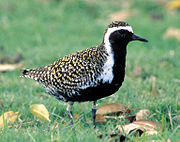
Charadriiformes
Charadriiformes is a diverse order of small to medium-large birds. It includes about 350 species and has members in all parts of the world. Most Charadriiformes live near water and eat invertebrates or other small animals; however, some are pelagic , some occupy deserts and a few are found in thick...
. Family: Charadriidae
Charadriidae
The bird family Charadriidae includes the plovers, dotterels, and lapwings, about 64 to 66 species in all.- Morphology :They are small to medium-sized birds with compact bodies, short, thick necks and long, usually pointed, wings, but most species of lapwing may have more rounded wings...
The family Charadriidae includes the plover
Plover
Plovers are a widely distributed group of wading birds belonging to the subfamily Charadriinae. There are about 40 species in the subfamily, most of them called "plover" or "dotterel". The closely related lapwing subfamily, Vanellinae, comprises another 20-odd species.Plovers are found throughout...
s, dotterels, and lapwing
Lapwing
Vanellinae are any of various crested plovers, family Charadriidae, noted for its slow, irregular wingbeat in flight and a shrill, wailing cry. Its length is 10-16 inches. They are a subfamily of medium-sized wading birds which also includes the plovers and dotterels. The Vanellinae are...
s. They are small to medium-sized birds with compact bodies, short, thick necks and long, usually pointed, wings. They are found in open country worldwide, mostly in habitats near water, although there are some exceptions. There are 66 species worldwide and 6 species which occur in Fiji.
| Species | Viti Levu | Vanua Levu | Taveuni | Kadavu | Lomaiviti | Lau | Rotuma | |
|---|---|---|---|---|---|---|---|---|
| Masked Lapwing Masked Lapwing The Masked Lapwing , previously known as the Masked Plover and often called the Spur-winged Plover or just Plover in its native range, is a large, common and conspicuous bird native to Australia, particularly the northern and eastern parts of the continent... Vanellus miles |
V | |||||||
| Pacific Golden Plover Pacific Golden Plover The Pacific Golden Plover is a medium-sized plover.The 23–26 cm long breeding adult is spotted gold and black on the crown, back and wings. Its face and neck are black with a white border and it has a black breast and a dark rump. The legs are black... Pluvialis fulva |
M | M | M | M | M | M | M | |
| Black-bellied Plover Pluvialis squatarola |
V | |||||||
| Double-banded Plover Double-banded Plover The Double-banded Plover , known as the Banded Dotterel in New Zealand, is a small wader in the plover family of birds. It lives in beaches, mud flats, grasslands and on bare ground... Charadrius bicinctus |
V | |||||||
| Lesser Sandplover Charadrius mongolus |
V | |||||||
| Caspian Plover Caspian Plover The Caspian Plover is a wader in the plover family of birds.It breeds on open grassland in central Asia, mainly to the north and east of the Caspian Sea. This bird breeds in loose colonies, with three eggs being laid in a ground nest. These birds migrate south in winter to east Africa, usually... Charadrius asiaticus |
V | |||||||
Sandpipers and allies

Charadriiformes
Charadriiformes is a diverse order of small to medium-large birds. It includes about 350 species and has members in all parts of the world. Most Charadriiformes live near water and eat invertebrates or other small animals; however, some are pelagic , some occupy deserts and a few are found in thick...
. Family: Scolopacidae
Scolopacidae
The sandpipers are a large family, Scolopacidae, of waders or shorebirds. They include many species called sandpipers, as well as those called by names such as curlew and snipe. The majority of these species eat small invertebrates picked out of the mud or soil...
The Scolopacidae are a large diverse family of small to medium sized shorebirds including the sandpipers, curlew
Curlew
The curlews , genus Numenius, are a group of eight species of birds, characterised by long, slender, downcurved bills and mottled brown plumage. They are one of the most ancient lineages of scolopacid waders, together with the godwits which look similar but have straight bills...
s, godwit
Godwit
The godwits are a group of large, long-billed, long-legged and strongly migratory wading birds of the genus Limosa. They form large flocks on coasts and estuaries in winter....
s, shanks
Tringa
Tringa is a genus of waders, containing the shanks and tattlers. They are mainly freshwater birds, often with brightly coloured legs as reflected in the English names of six species, as well as the specific names of two of these and the Green Sandpiper. They are typically associated with northern...
, tattlers
Tattler (bird)
The tattlers are the two very similar bird species in the shorebird genus Tringa. They formerly had their own genus, Heteroscelus. The old genus name means "different leg" in Greek, referring to the leg scales that differentiate the tattlers from their close relatives, the shanks.The species are:*...
, woodcock
Woodcock
The woodcocks are a group of seven or eight very similar living species of wading birds in the genus Scolopax. Only two woodcocks are widespread, the others being localized island endemics. Most are found in the Northern Hemisphere but a few range into Wallacea...
s, snipe
Snipe
A snipe is any of about 25 wading bird species in three genera in the family Scolopacidae. They are characterized by a very long, slender bill and crypsis plumage. The Gallinago snipes have a nearly worldwide distribution, the Lymnocryptes Jack Snipe is restricted to Asia and Europe and the...
s, dowitcher
Dowitcher
The three dowitchers are medium-sized long-billed wading birds. They resemble godwits in body and bill shape, and the reddish underparts in summer, but are much shorter legged, more like snipe to which they are also somewhat closer related...
s and phalarope
Phalarope
A phalarope or wadepiper is any of three living species of slender-necked shorebirds in the genus Phalaropus of the bird family Scolopacidae. They are close relatives of the shanks and tattlers, the Actitis and Terek Sandpipers, and also of the turnstones and calidrids...
s. The majority of species eat small invertebrates picked out of the mud or soil. Variation in length of legs and bills enable different species to feed in the same habitat, particularly on the coast, without direct competition for food. There are 89 species worldwide and 15 species which occur in Fiji.
| Species | Viti Levu | Vanua Levu | Taveuni | Kadavu | Lomaiviti | Lau | Rotuma | |
|---|---|---|---|---|---|---|---|---|
| Hudsonian Godwit Hudsonian Godwit The Hudsonian Godwit, Limosa haemastica, is a large shorebird.-Identification:Adults have long dark legs and a long pink bill with a slight upward curve and dark at the tip. The upper parts are mottled brown and the underparts are chestnut. The tail is black and the rump is white... Limosa haemastica |
V | |||||||
| Bar-tailed Godwit Bar-tailed Godwit The Bar-tailed Godwit is a large wader in the family Scolopacidae, which breeds on Arctic coasts and tundra mainly in the Old World, and winters on coasts in temperate and tropical regions of the Old World... Limosa limosa |
M | M | M | M | M | M | M | |
| Whimbrel Whimbrel The Whimbrel Numenius phaeopus, is a wader in the large family Scolopacidae. It is one of the mostwidespread of the curlews, breeding across much of subarctic North America, Europe and Asia as far south as Scotland.... Numenius phaeopus |
M | M | M | M | M | M | M | |
| Bristle-thighed Curlew Bristle-thighed Curlew The Bristle-thighed Curlew, Numenius tahitiensis, is a large shorebird that breeds in Alaska and winters on tropical Pacific islands. It has a long, decurved bill and bristled feathers at the base of the legs. Its length is about 43 cm and wingspan about 84 cm... Numenius tahitiensis |
M | M | M | M | M | M | M | |
| Far Eastern Curlew Far Eastern Curlew The Far Eastern Curlew or Eastern Curlew is a large shorebird most similar in appearance to the Long-billed Curlew, but slightly larger. It is mostly brown in color, differentiated from other curlews by its plain, unpatterned brown underwing... Numenius madagascariensis |
V | |||||||
| Terek Sandpiper Terek Sandpiper The Terek Sandpiper is a small migratory Palearctic wader species, the only member of the genus Xenus.- Description and systematics :... Xenus cinereus |
V | |||||||
| Common Sandpiper Common Sandpiper The Common Sandpiper is a small Palearctic wader. This bird and its American sister species, the Spotted Sandpiper , make up the genus Actitis. They are parapatric and replace each other geographically; stray birds of either species may settle down with breeders of the other and hybridize... Actitis hypoleucos |
V | |||||||
| Grey-tailed Tattler Grey-tailed Tattler The Grey-tailed Tattler, Tringa brevipes , is a small shorebird.- Description :... Heteroscelus brevipes |
M | M | M | M | M | M | M | |
| Wandering Tattler Wandering Tattler The Wandering Tattler, Tringa incana , is a medium-sized wading bird. It is similar in appearance to the closely related Gray-tailed Tattler, T. brevipes... Heteroscelus incana |
M | M | M | M | M | M | M | |
| Ruddy Turnstone Ruddy Turnstone The Ruddy Turnstone is a small wading bird, one of two species of turnstone in the genus Arenaria. It is now classified in the sandpiper family Scolopacidae but was formerly sometimes placed in the plover family Charadriidae... Arenaria interpres |
M | M | M | M | M | M | M | |
| Red Knot Red Knot The Red Knot, Calidris canutus , is a medium sized shorebird which breeds in tundra and the Arctic Cordillera in the far north of Canada, Europe, and Russia. It is a large member of the Calidris sandpipers, second only to the Great Knot... Calidris canutus |
V | |||||||
| Sanderling Sanderling The Sanderling is a small wader. It is a circumpolar Arctic breeder, and is a long-distance migrant, wintering south to South America, South Europe, Africa, and Australia... Calidris alba |
V | |||||||
| Red-necked Stint Red-necked Stint The Red-necked Stint is a small migratory wader.- Description :These birds are among the smallest of waders, very similar to the Little Stint, Calidris minuta, with which they were once considered conspecific... Calidris ruficollis |
V | |||||||
| Pectoral Sandpiper Pectoral Sandpiper The Pectoral Sandpiper, Calidris melanotos, is a small wader. It is sometimes separated with the "stint" sandpipers in Erolia. This may or may not represent a good monophyletic group, depending on the placement of the phylogenetically enigmatic Curlew Sandpiper , the type species of Erolia... Calidris melanotos |
V | |||||||
| Sharp-tailed Sandpiper Sharp-tailed Sandpiper The Sharp-tailed Sandpiper, Calidris acuminata is a small wader.- Taxonomy :More recently, a review of new data has indicated that this bird should perhaps better be placed into the genus Philomachus- as P... Calidris acuminata |
V | |||||||
| Viti Levu Snipe Viti Levu Snipe The Viti Levu Snipe, Coenocorypha miratropica, was a species of snipe endemic to Fiji. A species of the mostly New Zealand genus Coenocorypha, it became extinct after the arrival of humans in Fiji.-References:... Coenocorypha miratropica* |
X | |||||||
Skuas
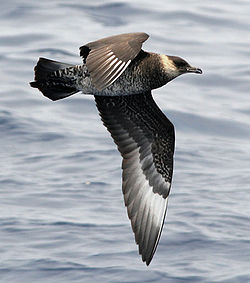
Charadriiformes
Charadriiformes is a diverse order of small to medium-large birds. It includes about 350 species and has members in all parts of the world. Most Charadriiformes live near water and eat invertebrates or other small animals; however, some are pelagic , some occupy deserts and a few are found in thick...
. Family: Stercorariidae
The family Stercorariidae are, in general, medium to large birds, typically with grey or brown plumage, often with white markings on the wings. They nest on the ground in temperate and arctic regions and are long-distance migrants. There are 7 species worldwide and 4 species which occur in Fiji.
| Species | Viti Levu | Vana Levu | Taveuni | Kadavu | Lomaiviti | Lau | Rotuma | |
|---|---|---|---|---|---|---|---|---|
| South Polar Skua South Polar Skua The South Polar Skua, Stercorarius maccormicki, is a large seabird in the skua family Stercorariidae. An older name for the bird is MacCormick’s Skua, after explorer and naval surgeon Robert McCormick, who first collected the type specimen... Stercorarius maccormicki |
V | |||||||
| Pomarine Skua Pomarine Skua The Pomarine Skua, Stercorarius pomarinus, known as Pomarine Jaeger in North America, is a seabird in the skua family Stercorariidae. It is a migrant, wintering at sea in the tropical oceans.- Taxonomy :... Stercorarius pomarinus |
V | |||||||
| Arctic Skua Arctic Skua The Parasitic Jaeger, also known as the Arctic Skua or Parasitic Skua, is a seabird in the skua family Stercorariidae.... Stercorarius parasiticus |
V | |||||||
| Long-tailed Skua Long-tailed Skua The Long-tailed Skua, Stercorarius longicaudus is a seabird in the skua family Stercorariidae.... Stercorarius longicaudus |
V | |||||||
Gulls
Order: CharadriiformesCharadriiformes
Charadriiformes is a diverse order of small to medium-large birds. It includes about 350 species and has members in all parts of the world. Most Charadriiformes live near water and eat invertebrates or other small animals; however, some are pelagic , some occupy deserts and a few are found in thick...
. Family: Laridae
Laridae is a family of medium to large birds seabirds and includes gull
Gull
Gulls are birds in the family Laridae. They are most closely related to the terns and only distantly related to auks, skimmers, and more distantly to the waders...
s and kittiwake
Kittiwake
The kittiwakes are two closely related seabird species in the gull family Laridae, the Black-legged Kittiwake and the Red-legged Kittiwake . The epithets "Black-legged" and "Red-legged" are used to distinguish the two species in North America, but in Europe, where R...
s. They are typically grey or white, often with black markings on the head or wings. They have stout, longish bills and webbed feet. There are 55 species worldwide and 2 species which occur in Fiji.
| Species | Viti Levu | Vana Levu | Taveuni | Kadavu | Lomaiviti | Lau | Rotuma | |
|---|---|---|---|---|---|---|---|---|
| Silver Gull Silver Gull The Silver Gull also known simply as "seagull" in Australia, is the most common gull seen in Australia. It has been found throughout the continent, but particularly coastal areas. The South African Hartlaub's Gull and the New Zealand Red-billed Gull The Silver Gull (Chroicocephalus... Larus novaehollandiae |
V | |||||||
| Laughing Gull Laughing Gull The Laughing Gull, Leucophaeus atricilla, is a medium-sized gull of North and South America. It breeds on the Atlantic coast of North America, the Caribbean, and northern South America. Northernmost populations migrate further south in winter, and this species occurs as a rare vagrant to western... Larus atricilla |
V | |||||||
Terns
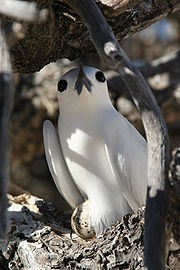
Charadriiformes
Charadriiformes is a diverse order of small to medium-large birds. It includes about 350 species and has members in all parts of the world. Most Charadriiformes live near water and eat invertebrates or other small animals; however, some are pelagic , some occupy deserts and a few are found in thick...
. Family: Sternidae
Tern
Tern
Terns are seabirds in the family Sternidae, previously considered a subfamily of the gull family Laridae . They form a lineage with the gulls and skimmers which in turn is related to skuas and auks...
s are a group of generally general medium to large sea-birds typically with grey or white plumage, often with black markings on the head. Most terns hunt fish by diving but some pick insects off the surface of fresh water. Terns are generally long-lived birds, with several species now known to live in excess of 25 to 30 years. There are 44 species worldwide and 12 species which occur in Fiji.
| Species | Viti Levu | Vanua Levu | Taveuni | Kadavu | Lomaiviti | Lau | Rotuma | |
|---|---|---|---|---|---|---|---|---|
| Great Crested Tern Sterna bergii |
B | B | B | B | B | B | B | |
| Black-naped Tern Black-naped Tern The Black-naped Tern is an oceanic tern mostly found in tropical and subtropical areas of the Pacific and Indian Oceans. It is rarely found inland.... Sterna sumatrana |
B | B | B | B | B | B | ||
| Common Tern Common Tern The Common Tern is a seabird of the tern family Sternidae. This bird has a circumpolar distribution, breeding in temperate and sub-Arctic regions of Europe, Asia and east and central North America. It is strongly migratory, wintering in coastal tropical and subtropical regions. It is sometimes... Sterna hirundo |
P | P | P | P | P | |||
| Little Tern Little Tern The Little Tern, Sternula albifrons or Sterna albifrons, is a seabird of the tern family Sternidae. It was formerly placed into the genus Sterna, which now is restricted to the large white terns . The former North American and Red Sea S. a... Sterna albifrons |
V | |||||||
| Fairy Tern Fairy Tern The Fairy Tern is a small tern which occurs in the southwestern Pacific.There are three subspecies:* Australian Fairy Tern, Sterna nereis nereis - breeds in Australia... Sterna nereis |
V | |||||||
| Sooty Tern Sooty Tern The Sooty Tern, Onychoprion fuscatus , is a seabird of the tern family . It is a bird of the tropical oceans, breeding on islands throughout the equatorial zone. Colloquially, it is known as the Wideawake Tern or just wideawake... Sterna fuscata |
B | B | B | B | B | B | B | |
| Brown Noddy Brown Noddy The Brown Noddy or Common Noddy is a seabird from the tern family. The largest of the noddies, it can be told from the closely related Black Noddy by its larger size and plumage, which is dark brown rather than black... Anous stolidus |
B | B | B | B | B | B | B | |
| Black Noddy Black Noddy The Black Noddy or White-capped Noddy is a seabird from the tern family. It resembles the closely related Brown or Common Noddy , but is smaller with darker plumage, a whiter cap, a longer, straighter beak and shorter tail... Anous minutus |
B | B | B | B | B | B | B | |
| Blue-grey Noddy Procelsterna cerulea |
B | B | B | B | B | B | B | |
| White Tern White Tern The White Tern is a small seabird found across the tropical oceans of the world. It is sometimes known as the Fairy Tern although this name is potentially confusing as it is the common name of the Fairy Tern Sternula nereis... Gygis alba |
B | B | B | B | B | B | B | |
Pigeons and doves
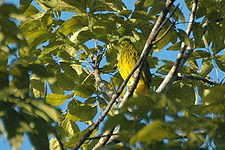
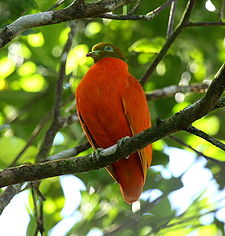
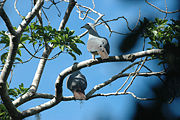
Columbiformes
Columbiformes are an avian order that includes the very widespread and successful doves and pigeons, classified in the family Columbidae, and the extinct Dodo and the Rodrigues Solitaire, long classified as a second family Raphidae. 313 species, found worldwide, comprise the Columbiformes order....
. Family: Columbidae
Pigeons and dove
Dove
Pigeons and doves constitute the bird family Columbidae within the order Columbiformes, which include some 300 species of near passerines. In general terms "dove" and "pigeon" are used somewhat interchangeably...
s are stout-bodied birds with short necks and short slender bills with a fleshy cere
Cère
The Cère is a long river in south-western France, left tributary of the Dordogne River. Its source is in the south-western Massif Central, near the mountain Plomb du Cantal...
. There are 308 species worldwide and 11 species which occur in Fiji.
| Species | Viti Levu | Vanua Levu | Taveuni | Kadavu | Lomaiviti | Lau | Rotuma |
|---|---|---|---|---|---|---|---|
| Rock Dove Columba livia |
I | I | I | ||||
| White-throated Pigeon Columba vitiensis |
B | B | B | B | B | B | |
| Spotted Dove Spotted Dove The Spotted Dove , also known as the Spotted Turtle Dove, is a pigeon which is a resident breeding bird in the Indian Subcontinent including India, Pakistan, Nepal and Sri Lanka east to southern Tibet and Southeast Asia... Streptopelia chinensis |
I | I | I | I | |||
| Friendly Ground Dove Gallicolumba stairi |
B | B | B | B | B | B | |
| Pacific Imperial Pigeon Ducula pacifica |
B | B | B | ||||
| Lau Imperial Pigeon Ducula lakeba |
X | X | |||||
| Peale's Imperial Pigeon Ducula latrans* |
B | B | B | B | B | B | |
| Many-coloured Fruit Dove Ptilinopus perousii |
B | B | B | B | B | B | |
| Purple-capped Fruit Dove Ptilinopus porphyraceus |
B | B | |||||
| Orange Dove Orange Dove The Orange Fruit Dove , also known as Flame Dove, is a small, approximately 20 cm long, short-tailed fruit-dove in the family Columbidae. One of the most colorful doves, the male has a golden olive head and elongated bright orange "hair-like" body feathers... Ptilinopus victor* |
B | B | |||||
| Golden Dove Golden Dove The Golden Fruit Dove , also known as the Lemon Dove or Yellow Dove, is a small, approximately 20 cm long, short-tailed fruit-dove in the family Columbidae. The common name refers to the males' bright golden-yellow colour. The body feathers appear almost iridescent due to their elongated... Ptilinopus luteovirens* |
B | B | |||||
| Whistling Dove Whistling Dove The Whistling Fruit Dove , also known as the Velvet Dove or Yellow-headed Dove, is a small fruit dove from Fiji... Ptilinopus layardi* |
B | ||||||
| Fiji Flightless Pigeon Natunaornis gigoura* |
X |
Parrots and lorikeets
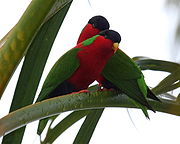
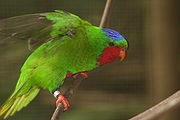
Parrot
Parrot
Parrots, also known as psittacines , are birds of the roughly 372 species in 86 genera that make up the order Psittaciformes, found in most tropical and subtropical regions. The order is subdivided into three families: the Psittacidae , the Cacatuidae and the Strigopidae...
s are small to large birds with a characteristic curved beak shape. Their upper mandibles have slight mobility in the joint with the skull and the have a generally erect stance. All parrots are zygodactyl, having the four toes on each foot placed two at the front and two back. There are 335 species worldwide and 6 species which occur in Fiji.
| Species | Viti Levu | Vana Levu | Taveuni | Kadavu | Lomaiviti | Lau | Rotuma |
|---|---|---|---|---|---|---|---|
| Collared Lory Collared Lory The Collared Lory is a monotypic species of parrot in the Psittacidae family, and it is the only species in the genus Phigys. It is endemic to the islands of Fiji. It is the only Fijian rainforest bird to adapt to urban landscapes and can be found in urban Suva... Phigys solitarius* |
B | B | B | B | B | B | |
| Blue-crowned Lorikeet Blue-crowned Lorikeet The Blue-crowned Lorikeet is a parrot found throughout the Samoa and Tonga islands and Lau archipelago, including: ʻAlofi, Fotuhaʻa, Fulago, Futuna, Haʻafeva, Niuafoʻou, Moce, Niuē, Ofu, Olosega, Sāmoa, Savaiʻi, Tafahi, Taʻu, Tofua, Tonga, Tungua, ʻUiha, ʻUpolu, Varoa, Vavaʻu, and Voleva... Vini australis |
B | ||||||
| Red-throated Lorikeet Red-throated Lorikeet The Red-throated Lorikeet Charmosyna amabilis is a critically endangered lorikeet endemic to Fiji. It is 18 cm long and is bright green overall, with red cheeks, throat and thighs.... Charmosyna amabilis* |
B? | B? | B? | X | |||
| Crimson Shining-parrot Crimson Shining-parrot The Crimson Shining Parrot, Prosopeia splendens, is a parrot from Fiji. The species is endemic to the islands of Kadavu and Ono in the Kadavu Group. The species was once considered conspecific with the Red Shining Parrot of Vanua Levu and Taveuni, but is now considered its own species... Prosopeia splendens* |
I | B | |||||
| Red Shining-parrot Red Shining-parrot The Maroon Shining Parrot or Red Shining-parrot is a species of parrot in the Psittacidae family. It endemic to the islands of Vanua Levu and Taveuni in Fiji and was introduced to the islands of southern Tonga in prehistoric times. The species is sometimes considered conspecific with the Crimson... Prosopeia personata* |
B | B | |||||
| Masked Shining-parrot Masked Shining-parrot The Masked Shining Parrot, Perruche Masquée, or Papagayo Enmascarado is a species of parrot in the Psittacidae family.It is endemic to Fiji.... Prosopeia tabuensis* |
B |
Cuckoos
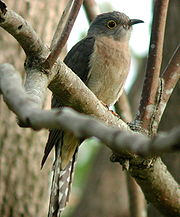
Cuculiformes
The near passerine bird order Cuculiformes traditionally included three families as below:* Musophagidae - turacos and allies* Cuculidae - cuckoos, coucals, roadrunners and anis* Opisthocomidae - Hoatzin...
. Family: Cuculidae
The family Cuculidae includes cuckoo
Cuckoo
The cuckoos are a family, Cuculidae, of near passerine birds. The order Cuculiformes, in addition to the cuckoos, also includes the turacos . Some zoologists and taxonomists have also included the unique Hoatzin in the Cuculiformes, but its taxonomy remains in dispute...
s, roadrunners
Geococcyx
The roadrunners are two species of bird in the genus Geococcyx of the cuckoo family, Cuculidae, native to North and Central America...
and anis
Ani (bird)
The anis are the three species of near-passerine birds in the genus Crotophaga of the cuckoo family. They are essentially tropical New world birds, although the range of two species just reaches the United States...
. These birds are of variable size with slender bodies, long tails and strong legs. Unlike the cuckoo species of the Old World, North American cuckoos are not brood parasites. There are 138 species worldwide and 2 species which occur in Fiji.
| Species | Viti Levu | Vana Levu | Taveuni | Kadavu | Lomaiviti | Lau | Rotuma |
|---|---|---|---|---|---|---|---|
| Fan-tailed Cuckoo Fan-tailed Cuckoo The Fan-tailed Cuckoo is a species of cuckoo in the Cuculidae family.It is found in Australia, Fiji, Indonesia, New Caledonia, New Zealand, Papua New Guinea, Solomon Islands, and Vanuatu.-Habitat:... Cacomantis flabelliformis |
B | B | B | B | B | ||
| Long-tailed Koel Eudynamys taitensis |
M | M | M | M | M | M |
Barn owls
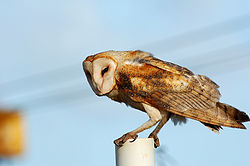
Tytonidae
Barn-owls are one of the two families of owls, the other being the true owls, Strigidae. They are medium to large sized owls with large heads and characteristic heart-shaped faces. They have long, strong legs with powerful talons...
Barn owl
Barn Owl
The Barn Owl is the most widely distributed species of owl, and one of the most widespread of all birds. It is also referred to as Common Barn Owl, to distinguish it from other species in the barn-owl family Tytonidae. These form one of two main lineages of living owls, the other being the typical...
s are medium to large sized owls with large heads and characteristic heart-shaped faces. They have long strong legs with powerful talons. There are 16 species worldwide and 2 species which occur in Fiji.
| Species | Viti Levu | Vana Levu | Taveuni | Kadavu | Lomaiviti | Lau | Rotuma |
|---|---|---|---|---|---|---|---|
| Australasian Grass-owl Tyto longimembris |
X? | ||||||
| Barn Owl Barn Owl The Barn Owl is the most widely distributed species of owl, and one of the most widespread of all birds. It is also referred to as Common Barn Owl, to distinguish it from other species in the barn-owl family Tytonidae. These form one of two main lineages of living owls, the other being the typical... Tyto alba |
B | B | B | B | B | B |
Frogmouths
Order: CaprimulgiformesCaprimulgiformes
The Caprimulgiformes is an order of birds that includes a number of birds with global distribution . They are generally insectivorous and nocturnal...
. Family: Podargidae
The frogmouths are a group of nocturnal birds related to the nightjar
Nightjar
Nightjars are medium-sized nocturnal or crepuscular birds with long wings, short legs and very short bills. They are sometimes referred to as goatsuckers from the mistaken belief that they suck milk from goats . Some New World species are named as nighthawks...
s. They are named for their large flattened hooked bills and huge frog-like gape, which they use to take insects. There are 12 species worldwide and 1 species was introduced to Fiji but subsequently was expirated.
| Species | Viti Levu | Vana Levu | Taveuni | Kadavu | Lomaiviti | Lau | Rotuma | |
|---|---|---|---|---|---|---|---|---|
| Tawny Frogmouth Tawny Frogmouth The Tawny Frogmouth is an Australian species of frogmouth, a type of bird found throughout the Australian mainland, Tasmania and southern New Guinea. The Tawny Frogmouth is often mistaken to be an owl... Podargus strigoides |
I X | |||||||
Swifts
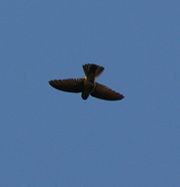
Apodiformes
Traditionally, the bird order Apodiformes contained three living families: the swifts , the tree swifts , and the hummingbirds . In the Sibley-Ahlquist taxonomy, this order is raised to a superorder Apodimorphae in which hummingbirds are separated as a new order, Trochiliformes...
. Family: Apodidae
Swift
Swift
The swifts are a family, Apodidae, of highly aerial birds. They are superficially similar to swallows, but are actually not closely related to passerine species at all; swifts are in the separate order Apodiformes, which they share with hummingbirds...
s are small aerial birds, spending the majority of their lives flying. These birds have very short legs and never settle voluntarily on the ground, perching instead only on vertical surfaces. Many swifts have long swept-back wings that resemble a crescent or a boomerang. There are 98 species worldwide and 2 species which occur in Fiji.
| Species | Viti Levu | Vana Levu | Taveuni | Kadavu | Lomaiviti | Lau | Rotuma | |
|---|---|---|---|---|---|---|---|---|
| White-rumped Swiftlet White-rumped Swiftlet The White-rumped Swiftlet is a species of swift in the Apodidae family.It is found in American Samoa, Fiji, New Caledonia, Papua New Guinea, Samoa, Solomon Islands, Tonga, and Vanuatu... Aerodramus spodiopygius |
B | B | B | B | B | B | ||
| White-throated Needletail White-throated Needletail The White-throated Needletail , also known as Needle-tailed Swift or Spine-tailed Swift, is a large swift. It is the fastest-flying bird in flapping flight, being capable of speeds up to 170 km/h .... Hirundapus caudacutus |
V | |||||||
Kingfishers
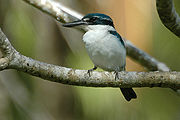
Coraciiformes
The Coraciiformes are a group of usually colorful near passerine birds including the kingfishers, the Hoopoe, the bee-eaters, the rollers, and the hornbills...
. Family: Alcedinidae
Kingfishers are medium-sized birds with large heads, long pointed bills, short legs, and stubby tails. There are 93 species worldwide and 1 species which occur in Fiji.
| Species | Viti Levu | Vana Levu | Taveuni | Kadavu | Lomaiviti | Lau | Rotuma |
|---|---|---|---|---|---|---|---|
| Collared Kingfisher Collared Kingfisher The Collared Kingfisher is a medium-sized kingfisher belonging to the family Halcyonidae, the tree kingfishers. It is also known as the White-collared Kingfisher or Mangrove Kingfisher. It has a wide range extending from the Red Sea across southern Asia and Australasia to Polynesia... Todirhamphus chloris |
B | B | B | B | B | B |
Swallows and martins

The Hirundinidae family is a group of passerines characterized by their adaptation to aerial feeding. Their adaptations include a slender streamlined body, long pointed wings and short bills with wide gape. The feet are designed for perching rather than walking, and the front toes are partially joined at the base. There are 75 species worldwide and 1 species which occurs in Fiji.
| Species | Viti Levu | Vana Levu | Taveuni | Kadavu | Gau | Ovalau | Lau | Rotuma |
|---|---|---|---|---|---|---|---|---|
| Pacific Swallow Pacific Swallow The Pacific Swallow or Hill Swallow is a small passerine bird in the swallow family. It breeds in tropical southern Asia from southern India and Sri Lanka across to south east Asia and the islands of the south Pacific. It is resident apart from some local seasonal movements... Hirundo tahitica |
B | B | B | B | B | B | B |
Cuckoo-shrikes
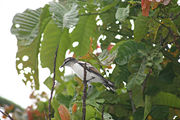
The cuckoo-shrikes are small to medium-sized passerine birds. They are predominantly greyish with white and black, although some species are brightly coloured. There are 82 species worldwide and 1 species which occurs in Fiji.
| Species | Viti Levu | Vana Levu | Taveuni | Kadavu | Lomaiviti | Lau | Rotuma |
|---|---|---|---|---|---|---|---|
| Polynesian Triller Polynesian Triller The Polynesian Triller is a passerine bird belonging to the triller genus Lalage in the cuckoo-shrike family Campephagidae. It has numerous subspecies distributed across the islands of the south-west Pacific.It is 15 to 16 cm long... Lalage maculosa |
B | B | B | B | B | B | B |
Bulbuls
Order: Passeriformes. Family: PycnonotidaeBulbuls are medium-sized songbirds. Some are colourful with yellow, red or orange vents, cheeks, throat or supercilia, but most are drab, with uniform olive brown to black plumage. Some species have distinct crests.There are 130 species worldwide and 1 species which occurs in Fiji.
| Species | Viti Levu | Vana Levu | Taveuni | Kadavu | Lomaiviti | Lau | Rotuma |
|---|---|---|---|---|---|---|---|
| Red-vented Bulbul Red-vented Bulbul The Red-vented Bulbul is a member of the bulbul family of passerine birds. It is resident breeder in tropical southern Asia from India and Sri Lanka east to Burma and southwestern China. It has been introduced and has established itself in the wild in many Pacific islands including Fiji, Samoa,... Pycnonotus cafer |
I | I |
Thrushes and allies
Order: Passeriformes. Family: TurdidaeThe thrushes
Thrush (bird)
The thrushes, family Turdidae, are a group of passerine birds that occur worldwide.-Characteristics:Thrushes are plump, soft-plumaged, small to medium-sized birds, inhabiting wooded areas, and often feed on the ground or eat small fruit. The smallest thrush may be the Forest Rock-thrush, at and...
are a group of passerine birds that occur mainly in the Old World. They are plump, soft plumaged, small to medium-sized insectivores or sometimes omnivores, often feeding on the ground. Many have attractive songs. There are 335 species worldwide and 1 species which occurs in Fiji.
| Species | Viti Levu | Vana Levu | Taveuni | Kadavu | Lomaiviti | Lau | Rotuma |
|---|---|---|---|---|---|---|---|
| Island Thrush Island Thrush The Island Thrush is a common forest bird in the thrush family. Almost 50 subspecies have been described, ranging from Taiwan, through South East Asia and Melanesia, to Samoa, exhibiting great differences in plumage... Turdus poliocephalus |
B | B | B | B | B |
Old World warblers
Order: Passeriformes. Family: SylviidaeSylviidae
Sylviidae is a family of passerine birds that was part of an assemblage known as the Old World warblers. The family was formerly a wastebin taxon with over 400 species of bird in over 70 genera. The family was poorly defined with many characteristics shared with other families...
The family Sylviidae is a group of small insectivorous passerine birds. The Sylviidae mainly occur as breeding species, as the common name implies, in Europe, Asia and, to a lesser extent Africa. Most are of generally undistinguished appearance, but many have distinctive songs. There are 291 species worldwide and 2 species which occur in Fiji.
| Species | Viti Levu | Vana Levu | Taveuni | Kadavu | Lomaiviti | Lau | Rotuma |
|---|---|---|---|---|---|---|---|
| Fiji Bush-warbler Fiji Bush-warbler The Fiji Bush-warbler is a species of Old World warbler in the Sylviidae family.It is endemic to the islands of Fiji. There are four subspecies occurring on all the main islands of the group... Cettia ruficapilla* |
B | B | B | B | |||
| Long-legged Warbler Long-legged Warbler The Long-legged Thicketbird, Trichocichla rufa, is a small Old World warbler endemic to Fiji. The species is sometimes known as the Long-legged Warbler. It is the sole representative of the genus Trichocichla.... Trichocichla rufa* |
B | B |
Fantails
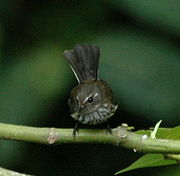
The Fantails are small insectivorous birds which are specialist aerial feeders. There are 44 species worldwide and 2 species which occur in Fiji.
| Species | Viti Levu | Vana Levu | Taveuni | Kadavu | Lomaiviti | Lau | Rotuma |
|---|---|---|---|---|---|---|---|
| Streaked Fantail Streaked Fantail The Streaked Fantail is a species of bird in the Rhipiduridae family. Rhipidura verreauxi has precedence over Rhipidura spilodera . It is found in Fiji, New Caledonia, and Vanuatu... Rhipidura spilodera |
B | B | B | B | |||
| Kadavu Fantail Kadavu Fantail The Kadavu Fantail is a species of bird in the fantail family Rhipiduridae.It is endemic to Kadavu and Ono in the Kadavu Islands, Fiji... Rhipidura personata* |
B |
Monarch flycatchers
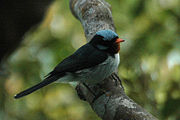
.jpg)
The monarch flycatchers are small to medium-sized insectivorous passerines, which hunt by flycatching. There are 99 species worldwide and 7 species which occur in Fiji.
| Species | Viti Levu | Vana Levu | Taveuni | Kadavu | Lomaiviti | Lau | Rotuma |
|---|---|---|---|---|---|---|---|
| Slaty Monarch Slaty Monarch The Slaty Monarch is a species of bird in the Monarchidae family.It is endemic to Fiji.Its natural habitat is subtropical or tropical moist lowland forests.-References:... Mayrornis lessoni* |
B | B | B | B | B | B | |
| Versicolour Monarch Ogea Monarch The Ogea Monarch is a species of bird in the Monarchidae family.It is endemic to two islands, Ogea Driki and Ogea Levu, in the Lau Group of south eastern Fiji.... Mayrornis versicolor* |
B | ||||||
| Fiji Shrikebill Fiji Shrikebill The Fiji Shrikebill is a songbird species in the family Monarchidae. The Manu'a Shrikebill, subspecies powelli may have gone extinct in the 1990 due to habitat destruction.... Clytorhynchus vitiensis |
B | B | B | B | B | B | B |
| Black-throated Shrikebill Black-throated Shrikebill The Black-throated Shrikebill is a songbird species in the family Monarchidae. The Santa Cruz Shrikebill or Nendo Shrikebill may be its subspecies sanctaecrucis or a distinct species.... Clytorhynchus nigrogularis |
B | B | B | B | B | ||
| Blue-crested Flycatcher Blue-crested Flycatcher The Azure-crested Flycatcher or Blue-crested Flycatcher is a species of bird in the monarch flycatcher family Monarchidae... Myiagra azureocapilla* |
B | B | B | ||||
| Vanikoro Flycatcher Vanikoro Flycatcher The Vanikoro Flycatcher, Myiagra vanikorensis is a species of monarch flycatcher in the family Monarchidae. It has a slightly disjunct distribution, occurring in Santa Cruz Islands in the southern Solomon Islands and the islands of Fiji... Myiagra vanikorensis |
B | B | B | B | B | B | |
| Silktail Silktail The Silktail, Lamprolia victoriae is a species of bird endemic to Fiji. It is the only member of the genus Lamprolia. This beautiful bird looks superficially like a diminutive bird of paradise but it is actually closely related to the fantails.... Lamprolia victoriae* |
B | B |
Australasian robins
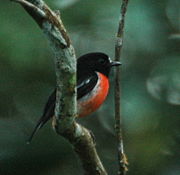
Petroicidae
The bird family Petroicidae includes roughly 45 species in about 15 genera. All are endemic to Australasia: New Guinea, Australia, New Zealand and numerous Pacific Islands as far east as Samoa. For want of an accurate common name, the family is often called the Australasian robins. Within the...
Most species of the Petroicidae have a stocky build with a large, rounded head, a short, straight bill, and rounded wingtips. They occupy a wide range of wooded habitats, from subalpine to tropical rainforest, and mangrove swamps to semi-arid scrubland. All are primarily insectivorous, although a few supplement their diet with seeds. There are 43 species worldwide and 1 species which occurs in Fiji.
| Species | Viti Levu | Vana Levu | Taveuni | Kadavu | Lomaiviti | Lau | Rotuma |
|---|---|---|---|---|---|---|---|
| Pacific Robin Pacific Robin The Pacific Robin , is a red-breasted Australasian robin in the passerine bird genus Petroica found on Norfolk Island, Melanesia and Polynesia. It is similar in plumage to the Scarlet Robin of Australia, and until recently the two were considered conspecific until split in 1999 by Schodde and Mason... Petroica multicolor |
B | B | B | B |
Whistlers and allies
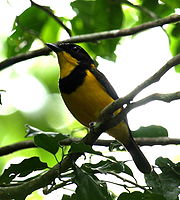
Pachycephalidae
The family Pachycephalidae, collectively the whistlers, includes the whistlers, shrike-thrushes, shrike-tits, pitohuis and Crested Bellbird, and is part of the ancient Australo-Papuan radiation of songbirds. Its members range from small to medium in size, and occupy most of Australasia...
The family Pachycephalidae includes the whistlers, shrike-thrushes, shrike-tits, pitohuis and Crested Bellbird. There are 57 species worldwide and 1 species which occurs in Fiji.
| Species | Viti Levu | Vana Levu | Taveuni | Kadavu | Lomaiviti | Lau | Rotuma |
|---|---|---|---|---|---|---|---|
| Fiji Whistler Fiji Whistler The Fiji Whistler is a species of bird in the Pachycephalidae family, which is endemic to Fiji. It is variably considered a subspecies of a widespread P. pectoralis, a subspecies of P... Pachycephala vitiensis |
B | B | B | B | B | B |
White-eyes
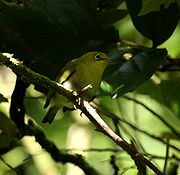
The white-eyes are small and are mostly of undistinguished appearance, the plumage above being generally either some dull color like greenish olive, but some species have a white or bright yellow throat, breast or lower parts, and several have buff flanks. As their name suggests many species have a white ring around the eyes. There are 96 species worldwide and 2 species which occur in Fiji.
| Species | Viti Levu | Vana Levu | Taveuni | Kadavu | Lomaiviti | Lau | Rotuma |
|---|---|---|---|---|---|---|---|
| Fiji White-eye Zosterops explorator* |
B | B | B | B | B | ||
| Silvereye Silvereye The Silvereye or Wax-eye is a very small passerine bird native to Australia, New Zealand and the south-west Pacific islands of Lord Howe, New Caledonia, Loyalty Islands, Vanuatu, and Fiji... Zosterops lateralis |
B | B | B | B | B |
Honeyeaters
Order: Passeriformes. Family: Meliphagidae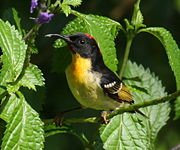
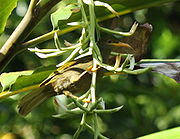
| Species | Viti Levu | Vana Levu | Taveuni | Kadavu | Lomaiviti | Lau | Rotuma |
|---|---|---|---|---|---|---|---|
| Rotuma Myzomela Rotuma Myzomela The Rotuma Myzomela is a species of bird in the Meliphagidae family.It is endemic to the island of Rotuma in the far north of Fiji.... Myzomela chermesina* |
B | ||||||
| Orange-breasted Honeyeater Orange-breasted Myzomela The Sulphur-breasted Myzomela , also known as the Orange-breasted Myzomela or Orange-breasted Honeyeater, is a species of bird in the Meliphagidae family.-Description:... Myzomela jugularis* |
B | B | B | B | B | B | |
| Wattled Honeyeater Wattled Honeyeater The Wattled Honeyeater is a species of bird in the honeyeater family Meliphagidae. It is the only species in the genus Foulehaio.... Foulehaio carunculata |
B | B | B | B | B | ||
| Kadavu Honeyeater Kadavu Honeyeater The Kadavu Honeyeater is a species of bird in the Meliphagidae family.It is endemic to the islands of Kadavu in Fiji.Its natural habitats are subtropical or tropical moist lowland forests and tropical mangrove forests.... Xanthotis provocator* |
B | ||||||
| Giant Honeyeater Gymnomyza viridis* |
B | B | B |
Woodswallows
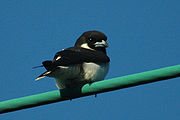
Artamidae
The family Artamidae gathers together 20 species of mostly crow-like birds native to Australasia and nearby areas.There are two subfamilies: Artaminae, the woodswallows, are sombre-coloured, soft-plumaged birds that have a brush-tipped tongue but seldom use it for gathering nectar. Instead, they...
The woodswallows are soft-plumaged, somber-coloured passerine birds. They are smooth, agile flyers with moderately large, semi-triangular wings. There are 11 species worldwide and 1 species which occurs in Fiji.
| Species | Viti Levu | Vana Levu | Taveuni | Kadavu | Lomaiviti | Lau | Rotuma |
|---|---|---|---|---|---|---|---|
| Fiji Woodswallow Fiji Woodswallow The Fiji Woodswallow is a species of woodswallow in the family Artamidae. It is endemic to most of the islands of Fiji, although it is absent from Kadavu Archipelago and the Lau Archipelago. The species was once considered a race of the White-breasted Woodswallow, which breeds from Australia, New... Artamus mentalis* |
B | B | B | B |
Bellmagpies and allies
Order: Passeriformes. Family: CracticidaeThe cracticids: currawong
Currawong
Currawongs are three species of medium-sized passerine birds belonging to the genus Strepera in the family Artamidae native to Australasia. These are the Grey Currawong , Pied Currawong , and Black Currawong . The common name comes from the call of the familiar Pied Currawong of eastern Australia...
s, bellmagpies, and butcherbird
Butcherbird
Butcherbirds are magpie-like birds in the genus Cracticus. They are native to Australasia. Their closest relatives are the three species of currawong...
s, are similar to the other corvids. They have large, straight bills and mostly black, white or grey plumage. All are omnivorous to some degree. Ther are 12 species worldwide and 1 species which occurs in Fiji.
| Species | Viti Levu | Vana Levu | Taveuni | Kadavu | Lomaiviti | Lau | Rotuma |
|---|---|---|---|---|---|---|---|
| Australian Magpie Australian Magpie The Australian Magpie is a medium-sized black and white passerine bird native to Australia and southern New Guinea. A member of the Artamidae, it is closely related to the butcherbirds... Gymnorhina tibicen |
I |
Starlings
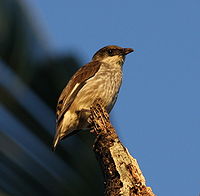
Starlings are small to medium-sized passerine birds. Their flight is strong and direct, and they are very gregarious. Their preferred habitat is fairly open country. They eat insects and fruit. Plumage is typically dark with a metallic sheen. There are 125 species worldwide and 4 species which occur in Fiji.
| Species | Viti Levu | Vana Levu | Taveuni | Kadavu | Lomaiviti | Lau | Rotuma |
|---|---|---|---|---|---|---|---|
| Polynesian Starling Polynesian Starling The Polynesian Starling is a species of starling of the family Sturnidae. It is found in American Samoa, Samoa, Fiji, Niue, Tonga, the Santa Cruz Islands, and Wallis and Futuna Islands. Its natural habitats are subtropical or tropical dry forests and tropical moist forests... Aplonis tabuensis |
B | B | B | B | B | B | B |
| European Starling European Starling The Common Starling , also known as the European Starling or just Starling, is a passerine bird in the family Sturnidae.This species of starling is native to most of temperate Europe and western Asia... Sturnus vulgaris |
I | ||||||
| Jungle Myna Jungle Myna The Jungle Myna, Acridotheres fuscus, is a myna, a member of the starling family.- Range :This bird is a common resident breeder in tropical southern Asia from Bangladesh, Pakistan, India and Burma east to Indonesia.- Habitat :... Acridotheres fuscus |
I | ||||||
| Common Myna Common Myna The Common Myna or Indian Myna also sometimes spelled Mynah, is a member of family Sturnidae native to Asia. An omnivorous open woodland bird with a strong territorial instinct, the Myna has adapted extremely well to urban environments... Acridotheres tristis |
I | I | I | I | I |
Waxbills and allies
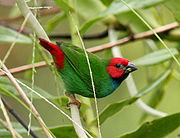
The estrildid finch
Estrildid finch
The estrildid finches are small passerine birds of the Old World tropics and Australasia. They can be classified as the family Estrildidae , or as a sub-group within the family Passeridae, which also includes the true sparrows....
es are small passerine birds of the Old World tropics and Australasia
Australasia
Australasia is a region of Oceania comprising Australia, New Zealand, the island of New Guinea, and neighbouring islands in the Pacific Ocean. The term was coined by Charles de Brosses in Histoire des navigations aux terres australes...
. They are gregarious and often colonial seed-eaters with short thick but pointed bills. They are all similar in structure and habits, but have a wide variation in plumage colours and pattern. There are 141 species worldwide and 4 species which occur in Fiji.
| Species | Viti Levu | Vana Levu | Taveuni | Kadavu | Lomaiviti | Lau | Rotuma |
|---|---|---|---|---|---|---|---|
| Red Munia Red Munia The Red Munia, Red Avadavat or Strawberry Finch is a sparrow-sized bird of the Munia family. It is found in the open fields and grasslands of tropical Asia and is popular as a cage bird due to the colourful plumage of the males in their breeding season. It breeds in South Asia during the Monsoon... Amandava amandava |
I | I | |||||
| Fiji Parrotfinch Fiji Parrotfinch The Fiji Parrotfinch is a species of estrildid finch endemic to Fiji that was formerly considered to be a subspecies of the Red-headed Parrotfinch. This parrotfinch is a small, mainly green bird with a red head and tail and a stubby dark grey bill... Erythrura pealii* |
B | B | B | B | |||
| Pink-billed Parrotfinch Pink-billed Parrotfinch The Pink-billed Parrotfinch is a species of estrildid finch found in island of Viti Levu, Fiji. Commonly found at undisturbed mature forest in the centre and east of Viti Levu, e.g. Joske's Thumb near Suva... Erythrura kleinschmidti* |
B | ||||||
| Java Sparrow Java Sparrow The Java Sparrow, Padda oryzivora also known as Java Finch, Java Rice Sparrow or Java Rice Bird is a small passerine bird. This estrildid finch is a resident breeding bird in Java, Bali and Bawean in Indonesia. It is a popular cagebird, and has been introduced in a large number of other... Padda oryzivora |
I | I | I |
Sparrows
Order: Passeriformes. Family: PasseridaeSparrow
Sparrow
The sparrows are a family of small passerine birds, Passeridae. They are also known as true sparrows, or Old World sparrows, names also used for a genus of the family, Passer...
s are small passerine birds. In general, sparrows tend to be small, plump, brown or grey birds with short tails and short powerful beaks. Sparrows are seed-eaters, and they also consume small insects. There are 35 species worldwide and 1 species which occurs in Fiji.
| Species | Viti Levu | Vanua Levu | Taveuni | Kadavu | Lomaiviti | Lau | Rotuma | |
|---|---|---|---|---|---|---|---|---|
| House Sparrow House Sparrow The House Sparrow is a bird of the sparrow family Passeridae, found in most parts of the world. One of about 25 species in the genus Passer, the House Sparrow occurs naturally in most of Europe, the Mediterranean region, and much of Asia... Passer domesticus |
I | |||||||

